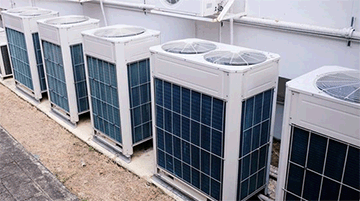|

 
|
Southwest HVAC News
Energy Department
helping develop new A/C technologies.
 Most
people look forward to enjoying the summer sun and beating the heat
in a cool, air-conditioned building. However, those dreading their
summer energy bills know the dog days of summer can mean high energy
consumption at a high price. Most
people look forward to enjoying the summer sun and beating the heat
in a cool, air-conditioned building. However, those dreading their
summer energy bills know the dog days of summer can mean high energy
consumption at a high price.
According to the U.S. Energy Information Administration, space
cooling will consume an estimated 1.28 quadrillion British thermal
units across the United States in 2017 — the equivalent to almost 39
million homes’ electricity use in a year. And that energy use adds
up.
In residential buildings, space cooling alone makes up 9 percentof a
home’s total energy consumption. Additionally, typical air
conditioning units use fluorocarbon refrigerants as a coolant,
which, if leaked, can lessen the efficiency of an AC system and
negatively impact the environment. However, proper maintenance of
the air conditioner can go a long way in helping to keep you cool
and increase the efficiency of your HVAC equipment during its
lifetime. Story
continues below ↓
advertisement
| your
ad here
The U.S. Department
of Energy’s Building Technologies Office is working on new air
conditioning technologies to greatly reduce energy use.
•Optimized Thermal Systems in Maryland is developing an advanced
heat exchanger that minimizes joints by 90 percent compared to
current models to reduce refrigerant leakage. By minimizing the
joints, the refrigerant stays where it should be.
•The University of Florida is developing a prototype that
combines a water heater, dehumidifier and air cooler, which
could result in more efficient heat transfer. This technology
provides enhanced dehumidification control in residential
buildings, resulting in better comfort and significant energy
savings.
•Dais Analytics in Florida, in partnership with Oak Ridge
National Laboratory (ORNL), is developing a new membrane-based
rooftop air conditioner, which would use water as a refrigerant
instead of conventional chemicals. Not only is this technology
perfect for sweltering, humid summer nights, but it could also
save 30-50 percent in electrical consumption compared to today’s
rooftop units.
•United Technologies Research Center in Connecticut is exploring
electrocaloric, solid-state technology to develop a heat pump
that will keep a space cool without using any chemical
refrigerants. This technology is ideal for residential and small
commercial buildings. It’s small and quiet, and could result in
25 percent system efficiency improvement. And, with fewer
mechanical parts, overall reliability could be improved.
•Oak Ridge National Laboratory in Tennessee, in partnership with
Georgia Tech and IntelliChoice Energy, is developing an energy
storage system that integrates with HVAC units to reduce the
overall energy requirements of A/C systems by using waste-heat
that would otherwise be lost in traditional systems. Integrating
ground-level diverse energy storage with HVAC could reach
overall energy storage efficiency of 70 percent and improve HVAC
performance by 35 percent.
.
|
|